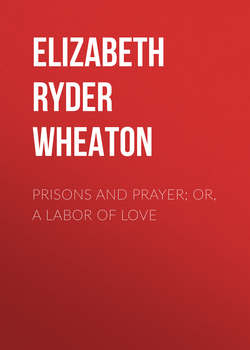Читать книгу Prisons and Prayer; Or, a Labor of Love - Elizabeth Ryder Wheaton - Страница 15
CHAPTER III.
A Plea for the Prisoner
PREJUDICE
ОглавлениеI find but little difference between humanity in prison walls and the humanity outside. Prisoners are our brothers and our sisters. We must soon meet them all at the judgment. They are naturally supposed to be guilty of crime of some kind. But they are not all criminals. Wicked men, willing to shield themselves, oftentimes throw suspicion on others, who are placed under arrest and convicted by circumstantial evidence or false testimony. Others, of course, are of the worst types of humanity. Some of them seem unworthy of the name of man or woman, yet even these Christ died to save, and God is able to deliver them and how shall His name be better glorified or His power be more manifest, than in their transformation?
Very many are so prejudiced against all those who are counted as criminals that they believe them to be utterly incapable of any good and are quick to believe that they see in them evidences of the deepest depravity.
A sad yet amusing illustration of this fact comes to my mind. Chaplain H., of the Reformatory for Boys at Kearney, Nebraska, is an honest-faced, true-hearted young man, full of zeal in the service of God. At one time when I stopped at Kearney he called for me at the train. As I looked at him he said, with a smile, "Did you think it was one of the boys whom the superintendent had sent for you?" I replied, "Yes; I did at first; you are so young, Mr. Chaplain;" and then he related to me the following circumstances which I give as nearly as I can in his own words:
"At one time Prof. Mallalieu and myself had been to Lincoln on business, and were returning together. We were quietly resting, and I was sitting with closed eyes, meditating, when a lady happened along and recognized the Superintendent, and said 'Have you got a boy there, taking him to the Reform Schools?'
"Considerably amused, he replied: 'Yes; this is a very bad fellow; I have had a lot of trouble with him, and have just recaptured him, and now I am watching to see that he doesn't make his escape.' The woman leaned over and, scanning my face and features, said: 'He has an awful bad look on his face; you can see he is a criminal and needs to be under strict discipline.'"
The dear young chaplain said, as he laughingly related this instance, that he learned a lesson in human nature that day. That woman, who imagined that she saw in the face of that young looking, honest, devoted Christian young man evidences of guilt and depravity, was only one among thousands who are led by prejudice when they imagine that they are exercising great discernment.
